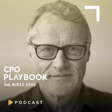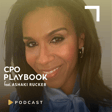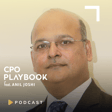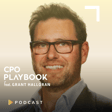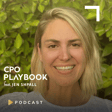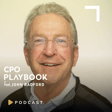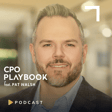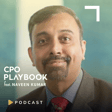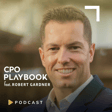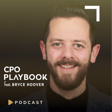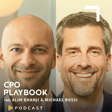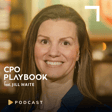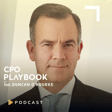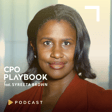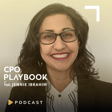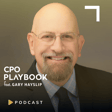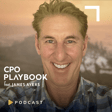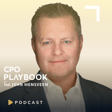Introduction to CPO Playbook with Felicia Shakiba
00:00:01
Speaker
I'm Felicia Shakiba, and this is CPO Playbook, where we solve a business challenge in every episode.
Impact of Cultural Integration on M&A Success
00:00:14
Speaker
Ignacio Fatiguzzi and Christopher Hanscom in their McKinsey article, The Importance of Cultural Integration in M&A, The Path to Success, assert that M&A deals employing advanced cultural management strategies significantly outperform those that do not.
Experian's Pandemic Acquisition: Challenges and Opportunities
00:00:33
Speaker
Over the past decade, M&A activities have accounted for $8.3 trillion in capital deployment,
00:00:40
Speaker
for the world's 2,000 largest companies across all sectors. A notable example is Experian, a 125-year-old data and analytical tool giant which acquired a new organization during the challenging years of the COVID pandemic. For Experian, the integration took an expanded meaning during this time.
Jochen Wern's Navy-Inspired Leadership Style
00:01:03
Speaker
we have the pleasure of speaking with Jochen Wern, CEO of Experian Dach, and will unveil insights for leading the transformation and cultural integration at Experian following their recent acquisition. Jochen, thank you for joining us today. I'd like to start by getting to know more about you and your background. How did your time in the Navy influence your working style?
00:01:30
Speaker
Alicia, many thanks for the invitation. And yeah, my time in the Navy was a very interesting one. I started there with 19 years and coming from the south of Germany, going totally north of Germany, and having grown up there in a little village, and now you go to the big world. And there's this old say which says, join the Navy, see the world.
00:01:53
Speaker
And the Navy promised it and delivered it. So it was quite fascinating. And when you're 19 years old and you haven't traveled that much in your world and your life, and suddenly you get out there, get in an environment which is completely different to where you grew up. It's a disciplined environment. It's a very clear military environment. And this is something where you learn so much. This is the first thing.
00:02:18
Speaker
The second thing, I've been a navigator in the Navy and so bringing ships from A to B, even though you do not have instruments or they fail or something like that and always have a plan B to go forward. And that was a very impressive time for me and it was probably a time which formed to live in my character and helped me also to overcome challenges and overcoming challenges because it was a normal duty.
00:02:45
Speaker
The normal duty was that you're on watch and you can just sleep every fourth night one night through. Otherwise, you're every night on watch and then you have to be precise and you're in a very close environment. 220 people on just 80 meters of length working, living and challenging together. Last but not least, it was not a normal unit.
00:03:09
Speaker
I've been navigator on board of our sail training ship because the cadets of the German Navy learn sailing on a three mast tall ship and learn to get along with nature on that. And where better than on a sailing ship, you're going to learn that. And suddenly you're in this community, this very close community with no private sphere, and you're together with something which is much bigger than you. And this is not the Navy, this is not the armed forces, this is nature.
00:03:36
Speaker
And you suddenly start to have a big respect within the storm, when you're out there, when you're tired. And this is really, really something which touched me and everything else, what I did in the upcoming years then, and helped me a lot after that, starting my career also and starting to lead the first small team and then further on all the other teams.
00:04:01
Speaker
It sounds like an amazing, challenging experience and I can see how some of those challenges that you had to deal with in the Navy and work with really shaped potentially how you are in your current role at Experian.
00:04:18
Speaker
I want to dive into your recent acquisition, which was made. Could you tell me why was this particular organization chosen and provide some context such as the number of employees involved, where they were located? And then I'd love to maybe paint the picture on how your working style really influences eventually how you've been able to onboard this or I guess acquire and merge this new business.
Experian's M&A Strategy and Challenges Amid COVID
00:04:49
Speaker
with pleasure. I think this is a very interesting story and it started prior to me joining Experian in what we should call here the DAF region. DAF stands for Dutchland, Germany, Austria and Switzerland. So this is the region where
00:05:04
Speaker
which I'm heading and where I'm the CEO of Experian. And Experian didn't have a big footprint in this market prior to acquiring from Arvato, Dortelsmann, a specialty unit, which has not only been one company, it has been several companies.
00:05:21
Speaker
And these several companies have been acquired by the former company, by Bertelsmann, which is a very traditional German publishing house, very successful, also over the years. So when you look at that, there are some small, medium-sized companies, and we speak about approximately 300 people, which were in Bertelsmann unit, and then which went into a joint venture with Experian in March 2020.
00:05:48
Speaker
And I think if a lot of us remember March 2020, it was a little bit one of the dark days, which I remember dark months. I know what I planned in these days and I planned the sailing expedition with friends.
00:06:03
Speaker
And then a virus came and we closed the world. At least it felt like that. And it's probably one of the worst moments to acquire a company and to integrate that, to bring a new culture on board, to motivate the people and so on. So that's no one's fault and no one has chosen a pandemic and to make an acquisition at that time. But maybe to see the circumstances of that.
00:06:26
Speaker
And the idea was to have a big footprint. So as you probably know in the United States, experience is well known for being a credit bureau. You have your scores and your credit score there. You can boost it, you can bring it to a life, and so on. And so the idea was also in Germany to buy a credit bureau for CI data. Plus, we acquired a couple of our companies on top of that. And this happened in this March 2020.
00:06:54
Speaker
When we move forward on the topic of integration, so I joined Experian in August 2023, what happened in these days before? We all had a big challenge in integrating not only companies,
00:07:10
Speaker
But in this special case, to integrate something where you cannot travel to, redo all your IT infrastructure, to redo your processes without being physically with someone together. Not with the management, not with the people, not with the teams and so on.
00:07:28
Speaker
And this is for sure a big, big challenge. Second, the idea was, and this was a correct idea, to start with a joint venture, because both companies had a lot of things in common, and Bertelsmann and Experian had also planned to work together in the future. And therefore, the joint venture, 60% of Experian, 40% of Bertelsmann still.
00:07:48
Speaker
And it would have made, in a normal circumstance, complete sense. In these circumstances, very clear. When you are an employee of a company, you see these changes, you listen to it, you hear the podcasts, you hear the management announcements, etc., but you don't see anyone. At least not that frequently as it should be exactly in these moments.
00:08:10
Speaker
So it was done the best what it could be. But as an employee and as a human being, I feel safe in what I already know. And I think this is quite a normal psychological case. And so I stay with one foot still in the old world, even though knowing there's something new to come. And this has probably been one of the big challenges.
00:08:33
Speaker
made up by COVID. There was a scene and it was, check, what can we do? How can we evolve this situation? And it became clear also what was planned from the beginning onwards, but in another staging, that experience needs to have 100% of the company and not a joint venture and need to make then an integration, ideally now under different circumstances with new management, et cetera. So in January, 2023,
00:09:01
Speaker
The rest of the 40% were bought by Experian. So it's 100% Experian company. And I started and joined in August, 2023. With that said, we came together on the 1st of August and the first thing we said, we have to create some successes together.
00:09:19
Speaker
This is a nice saying, a mentor of mine once told me, if you want to know what someone thinks, don't listen to what the person says, look what the person is doing and achieving. And this is really touching me and I think this is such a wonderful thing.
00:09:36
Speaker
It's a little bit like the topic of trust, and it is nothing else than trust. You come in into a new company, there's a new CEO, no one knows you, at least maybe from the press or from something else, but your personal, your style, what you do and so on, and they have to trust you. And they will give you a trust, everyone will give you a trust if it's a good company for a certain time. But then you have to together create what you promised. So on the 1st of August, when I started at 11.30,
00:10:02
Speaker
I held the speech to all employees. I said, thank you for the welcome. And I clearly gave a direction what we want to do. And this is with the products and with the people to grade first successes. This was the first goal, plus implementing of Gen AI training and all these things. So as you know it,
00:10:24
Speaker
Felicia, when we fall in love, we give immediately trust for a certain time. In all our things, I promise something, also in a relationship, and I deliver. This creates trust. I promise, I deliver. I promise, I deliver. And exactly this is also what we created, and there are great people here, absolutely great people. But with this new spirit, which we all together had, where we moved forward, we created first successes.
00:10:50
Speaker
Success then again brings confidence. And suddenly the confidence came and it was said, well, experience, cool. Experience, good. And experience totally different to what we had in the old days. Experience is a company where 20,000 people, more than 20,000, have just one thing in mind. How do we make out of data something that makes sense? Decisions, et cetera, et cetera.
00:11:15
Speaker
And everyone is all day thinking about that, how to make life better for people with data, et cetera. And suddenly with this big footprint, the people understood and touched it and got success with this new way forward. And that was great to see. And I'm very proud of everyone because really that was something where you had to change yourself.
00:11:40
Speaker
And everyone being a long time
Leadership and Cultural Integration Post-Acquisition
00:11:43
Speaker
with the old company, which was a good one, no doubt about that, but a different one, had to change the style of work. And everyone who did it and achieved success got this confidence.
00:11:54
Speaker
And where we are today, we are in a total different setup. We changed the go-to-market unit, we changed the operational units, and we changed the way how we work together, and that created a teamwork. We are not at the end, so it's not even a year that we work together in this circumstance. We have a lot of changes in there, we had to change, but we are on a very good track.
00:12:15
Speaker
Tell me more about what are the one or two major changes you had to make. I mean, I can only imagine that in any merger or acquisition, it's challenging to get culture in sync.
00:12:31
Speaker
I would imagine this is one of the biggest challenges, but what were those challenges? What did they look like for you? Was it cultural integration? Was it communication? Was it vision, getting everyone aligned on vision? Was it dislocation? Where would you even start? Where did you start?
00:12:51
Speaker
Let's start with awareness. I think this is one of the most important things. For sure know the quote of Peter Drucker, a culture eats strategy for breakfast. Yes, I'm familiar. A great quote. It is a great quote. And if you do not interlate this quote and make it your daily thoughts and you think, why don't someone doesn't understand it and so on and so on.
00:13:11
Speaker
And you go with the, oh, we are great, we do it like we do it in America or in the US, like we do it in Brazil, like we do in the UK. It will not work. You have to accept and to understand what was the mindset of the team you're working out with. And also there, we are all individuals. This is important to understand. And every single mindset is different. And if you go there, you have to start to create awareness of what is the new. And then you can speak about it, you can communicate, which is
00:13:40
Speaker
very important you cannot stop communicating ideally in person and not via teams or something like that but use every mean you have to communicate changes you want to make and successes you had together with the team because you never do it alone
00:13:55
Speaker
as a CEO, you have great people around you in your leadership team and on every position there and then you have to change with this awareness somehow the mindset and very clear after a long time of covid people have changed themselves and you have to get this feeling back you have to get this
00:14:14
Speaker
not only a feeling back, the way of working back. Because COVID changed, I think, not only here, but in many, many companies a lot. And Experian did a great job in COVID globally, so they kept the people.
00:14:28
Speaker
They didn't do harsh measures or something. This was prior to my time and gave this confidence that you're here in a very safe and very good environment and place. The second thing we had to do is clearly changing our mindset, how we approach the market. How we approach the market is also something, how are you seen in the market? The brand experience in the German market, for example, hasn't been very established because
00:14:54
Speaker
we weren't active in the market in this big manner as we are now. And so we have to create brand awareness on that. Bertelsmann is a very well-known, very traditional, very old family-owned business, very well-known, but experience wasn't. Today, as of today, so we saw it last week when a big conference invited SD data specialists sitting together with the whole parliament, the ministers and the CEOs of the Dachsen-Nester companies here in Germany,
00:15:24
Speaker
And we were on the forefront where we belong to. And this is clearly something people see and helps to get more confidence, broader shoulders, and to go out and show how we can make the difference. And this making the difference is something you have to live. You cannot put in a PowerPoint presentation because when you're in front of the client, in front of anyone else, you are the only one and you're alone there.
00:15:53
Speaker
And then it will show, have you inherited it? Have you changed yourself? Are you still going there and saying, we are one of the niche players, we have also a right to say something, please. That's not the way. Because if you look at our data asset, if you look at our scores, if you look at our products, which are top-notch globally, this is a totally different way. But it needs it. So I come back to the topic.
00:16:18
Speaker
needs a change of the mindset. And the change of the mindset is not only happening in the mind, it's happening in the mind with the results you really produce. Then you have a real mindset shift. And so the mindset shift is coming from what you say, the behaviors of leadership, what you do and what you stand for.
00:16:45
Speaker
Correct. From the leadership and it has to start from the leadership and as it means walk to talk. So if you're just coming from the Navy times, give orders and hope that someone obeys the orders. You're in the wrong place here in a company where individuals work together and bring things forward. The Navy is one beast.
00:17:04
Speaker
It is very good for discipline, it is very good for organization, it's very good regulated for everything of that. It is not for innovative minds. And this is probably also of the points why I left the Navy, even though saying still today, it's one of the most honorable jobs being kept on the ship. But I saw too many frustrated, very good officers.
00:17:26
Speaker
who could not express themselves and change the system because you're not changing an armed forces system. And probably you should not change it because there need to be these rules and an armed forces has to work in a certain way. And a company which is in competition has to work in a totally different way. You have to have the best talents, the best minds with you because otherwise they're with the competition and then they work against you. So this is what you have to create. And as a first thing, and this is nevertheless something I learned in the Navy,
00:17:56
Speaker
Walk the talk. You're in the front with your people. When you lead people, you're with them. If you're the leader in a sales unit, you have to be with them with the client. Back them, support them, show them how it works. Later on, they have to work on their own. But if you're not able to do that, you should not be the leader of that squad, of that team, and so on. And this is equal in sales, where it's very easy and clear to understand, but also in IT, in operations, and in other things.
00:18:23
Speaker
and this is one of the topics, the second thing is you have to be fast. Because this trust which is given to you at the beginning is just of a short period of time. In this period of time, you have to walk the talk, you have to create results, then people will trust, then people will change their minds and say, okay, this person I followed, this company I follow, here I'm right, here I can bring a big piece of my know-how and of my life to life.
00:18:51
Speaker
I think that was a really clear distinction between maybe culture and business culture or any culture that needs cross-functional collaboration. And like you said, innovation speaking up, the ability to feel like they can speak up. What were some of the differences between the company that you had just acquired and the company you have an experience?
00:19:20
Speaker
What were some of the major differences that you saw, and how did you approach those specifically? One of the major differences was probably the local culture. There's also one big say, I think we had it before, strategies global, business is local. And it's always difficult, not difficult, but I think you have to know it, if an international company is entering into a new market and is trying to approach now the US way in Germany,
00:19:49
Speaker
Big question mark there. The other way around, I mean, great German company, as you know, Mercedes, for example, they acquired a certain point, Chrysler, and said we show how to create cars. And it failed. And Mercedes said that was not the right way to approach how we do it. And so this adaption is very important. And Experian has this culture. Experian is a European
Bridging International and Local Cultures at Experian
00:20:11
Speaker
company at the FTSE with the headquarters in Dublin.
00:20:14
Speaker
And so in so many different countries and so many international people, this is something which is really the DNA of experience. Now, the acquired companies were deep-rooted German local companies, we have to say. And therefore the culture was also deep-rooted German in this manner and proud of the market which they created in these days and from scratch and so on.
00:20:39
Speaker
Now, bringing these two cultures of an international, globally-acting player with international rules in a global group together, with grown-up German companies with their own rules, and Germans are very considerate as a German. We're proud of our rules and we obey rules. This is such a cultural thing, which we always think. Letting go of our rules and going to our rules
00:21:02
Speaker
might sometimes be a little bit a mindset change also for us. So that's something what happened. So bringing all these 12 things together, convincing that being in a big group with all the new rules, especially on security, IT security, safety of our system, safety of our data, and so on in this big manner has an advantage because it's safe and secure. It has a disadvantage because you have to put more work into it. So logging in takes a little longer.
00:21:30
Speaker
updating every, for some people, failed every day their systems to be aware of the newest anti-fraud software and so on and so on, is to live with a hassle. But it is necessary. And step by step, you have to convince the people that this is good, that this is different, but it makes sense. So if you know something which seemed to be easier, but you're not aware of the dangers which are in the world now, then it needs to live with a conviction and a time to overlap them. But all this is possible.
00:22:01
Speaker
How did you convince this, I guess, local culture to adapt? And I think that one thing to point out was that you were also aware that your mind shift might need
00:22:16
Speaker
coaxing and how do we adapt? How do we look at what they're doing? And there was a time when I was putting together the performance management strategy for a global business and I had to work with all their subsidiaries and I had to figure out, well, how do we create this one for all strategy around performance?
00:22:34
Speaker
without breaking the subcultures locally, like where could we make room for people to really do their own thing? Was that your experience or did you say that, you know, everything has to be meshed together? What did that approach look like for you? And was it successful? Is it successful today?
00:22:55
Speaker
Let me bring up two things about it. I've also been new to Experian, so I haven't annihilated this wonderful culture over a long time. I went through my interviews and I already saw in interviews there's something different in this company.
00:23:11
Speaker
something I really appreciate. I had many many interviews with many different people and I started to really admire this company in the way how the people were open, mindful and very open to support and to help.
Support from Leadership: Key to Successful Integration
00:23:26
Speaker
This gave me as a first step my starting experience something where I said oh now we have to stand in front of a lot of people in the dust market
00:23:36
Speaker
and convince them of experience which you also just got to know. Firstly, secondly, you have to have this conviction, otherwise it doesn't work. The second thing is you need also support. So speaking about myself,
00:23:50
Speaker
I had the great support from my boss, who's the CEO of EMEA and APEC region, Marlon Holmberg. And she was just fantastic in every single step supported me. Then from EMAP, also our chief people officer, Emma Nola, she helped me and we are in the CPO podcast here, so I'm not the professional. That's great to hear that you've been collaborating with your CPO. That's good news.
00:24:19
Speaker
Not only that, all these transformational topics, they challenged it before me and they knew how difficult it is. And I absolutely admire how they did it, how they prepared the crown that now when a new CEO came in, this CEO had the chance to change things, to bring it to life.
00:24:39
Speaker
what they prepared, and then the big support in this time to bring the things forward, to find your way also in the new organization, to get the support from all different functions with big matrix organization. And this was really something which frees your back and which gives you so much of support and of conviction on what you're doing and how you can do it so you can really put the measures in and you never had fights or anything like that.
00:25:08
Speaker
really to say. You see, I'm without words because they touched me a little bit emotionally because it was the case. And now that the next job is, as I said, if you could enforce the structure, your job is getting this market now to life and to make it an experienced market and not our company market.
00:25:24
Speaker
And to make the people think and experience. And I think we are there and they are, we are on the way, but on a perfect path. And I would say most or all this is always a big word. And most of the people are now in the experiment path, in the experiment family and feel, hold me here. And this is, I think, a very important achievement, which the whole team did. And I was lucky enough to have the support and you need support. Otherwise you will not make it in a group, a big group as we are.
00:25:52
Speaker
Well, I definitely think that this type of work takes time and doing it. There is a challenge in doing it too quickly or even doing it too slowly, bringing in other cultures of the business.
00:26:07
Speaker
There's a lot of resistance in doing things differently. And I think that leveraging your teammates, your fellow executive team members, walking the talk, having your own self-awareness, thinking about mindset, and bringing everyone together under one roof are all incredible feats. And so thank you so much for sharing your story.
00:26:33
Speaker
It's fascinating to hear how every company can approach things differently, but also understand and see the themes that work. It's just lovely hearing your story. So thank you so much for being here today. Many
Conclusion and Call to Action by Felicia Shakiba
00:26:49
Speaker
thanks, Alicia, for inviting me. That's Jochen Wern, CEO of ExperianDAC, overseeing Germany, Austria, and Switzerland.
00:27:00
Speaker
If today's episode captured your interest, please consider sharing it with a friend or visit cpoplaybook.com to read the episode or learn more about leadership and talent management. We greatly appreciate your rating, review, and support as a subscriber. I'm Felicia Shakiba. See you next Wednesday and thanks for listening.

